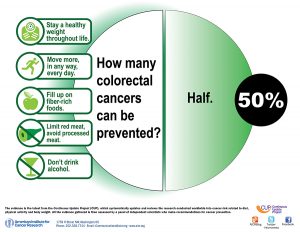What you eat can play a big role in preventing colorectal cancer, with research showing that fiber-filled foods lower risk; red and processed meats increase it. Now a study hones in on how diet can affect risk, showing that swapping a high-fiber healthy diet for a low-fiber western-style diet alters gut bacteria and signs of inflammation that may play a role in colon cancer.
The study is published in Nature Communications and it adds to a growing body of research on how our bacteria – our microbiota – play a role in cancer risk.
For the study, researchers flipped the diets of 20 African Americans and 20 South Africans for two weeks. All the participants had colonoscopy exams before and after the diet swap.
The Americans were served African-style foods, almost quadrupling their fiber intake to an amount equal to over 3.5 cups of beans. At the same time, they cut their calories from fat in half. Africans went the opposite direction, dramatically cutting their fiber and upping their fat intake.
After two weeks on the African diet, the Americans had less markers of inflammation in the colon while those same markers increased among the Africans eating the less healthy diet. There were also opposing increases and decreases of the compound butyrate, which forms from digesting fiber and is linked to lowering colon cancer risk. The American group was producing more butyrate; the Africans on the American diet less.
There were many other changes in the two groups’ microbiota, as seen from the different by-products or metabolites that the bacteria produce. One metabolite that increased after the switch, for example, is produced from phytochemicals found in green vegetables.
Longer studies are needed, note the authors, but this short-term study shows the power of diet on colon health, note the authors.
 Given the standard US diet, AICR estimates that half of all colorectal cancer cases are preventable if we were all to eat healthier, move more and stay lean. (At the start of this study, nine of the Americans were found to have abnormal colon growth called polyps – which were removed- none of the Africans had any.)
Given the standard US diet, AICR estimates that half of all colorectal cancer cases are preventable if we were all to eat healthier, move more and stay lean. (At the start of this study, nine of the Americans were found to have abnormal colon growth called polyps – which were removed- none of the Africans had any.)
You can learn more about reducing your risk of colon cancer on our site.
The study was funded by the National Institutes of Health in the US and the National Institute for Health Research Imperial Biomedical Research Centre in the UK.





